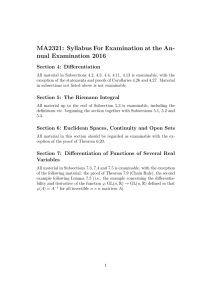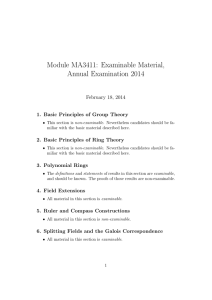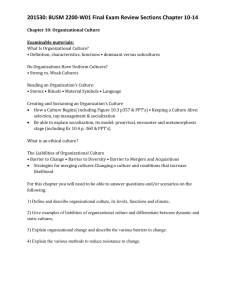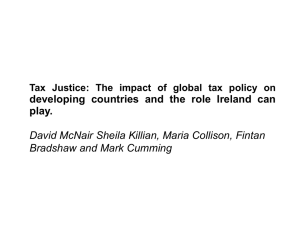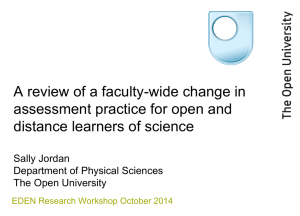Ireland Examiner`s meeting – F6 IRL
advertisement
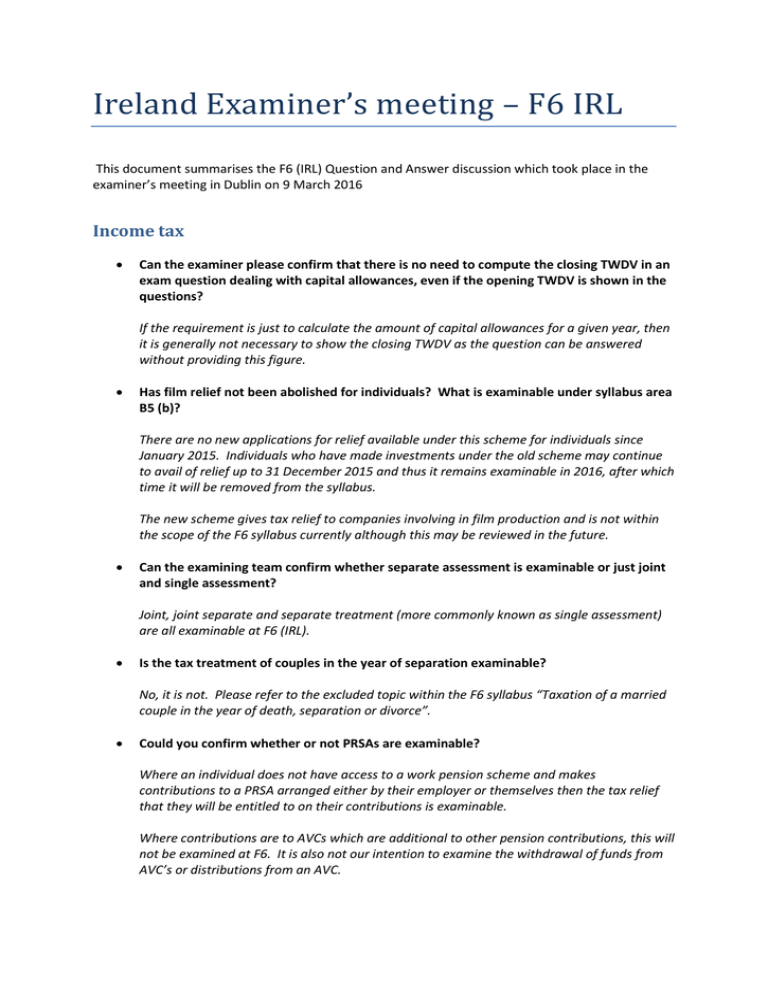
Ireland Examiner’s meeting – F6 IRL This document summarises the F6 (IRL) Question and Answer discussion which took place in the examiner’s meeting in Dublin on 9 March 2016 Income tax Can the examiner please confirm that there is no need to compute the closing TWDV in an exam question dealing with capital allowances, even if the opening TWDV is shown in the questions? If the requirement is just to calculate the amount of capital allowances for a given year, then it is generally not necessary to show the closing TWDV as the question can be answered without providing this figure. Has film relief not been abolished for individuals? What is examinable under syllabus area B5 (b)? There are no new applications for relief available under this scheme for individuals since January 2015. Individuals who have made investments under the old scheme may continue to avail of relief up to 31 December 2015 and thus it remains examinable in 2016, after which time it will be removed from the syllabus. The new scheme gives tax relief to companies involving in film production and is not within the scope of the F6 syllabus currently although this may be reviewed in the future. Can the examining team confirm whether separate assessment is examinable or just joint and single assessment? Joint, joint separate and separate treatment (more commonly known as single assessment) are all examinable at F6 (IRL). Is the tax treatment of couples in the year of separation examinable? No, it is not. Please refer to the excluded topic within the F6 syllabus “Taxation of a married couple in the year of death, separation or divorce”. Could you confirm whether or not PRSAs are examinable? Where an individual does not have access to a work pension scheme and makes contributions to a PRSA arranged either by their employer or themselves then the tax relief that they will be entitled to on their contributions is examinable. Where contributions are to AVCs which are additional to other pension contributions, this will not be examined at F6. It is also not our intention to examine the withdrawal of funds from AVC’s or distributions from an AVC. Corporation tax Could the examining team give guidance as to what is examinable under the syllabus objective “Double taxation relief for withholding tax and underlying tax”? As we know, relief is given from double taxation in one of three ways – 1. The deduction method 2. The credit method; and 3. The exemption method At the F6 level, candidates are expected to be aware of these three methods. Where the deduction method is applied, any foreign tax suffered should be deducted by the Irish company as an expense. Where the credit method is applied, any foreign tax suffered should be credited against the Irish tax due and this relief is restricted to the amount of Irish tax suffered on the same income. However, candidates would not be expected to calculate the underlying effective rate of tax and this is in line with the depth of knowledge required in the other fundamental tax exams. Where the exemption method is applied, the income (which has been taxed overseas) is exempt from Irish tax. Where a double tax treaty exists, relief will be given by the more generous credit or exemption methods. Social insurance Since Class A1 PRSI applies to weekly incomes in excess of €500, can it be confirmed that questions will not seek the computation of PRSI for employees on weekly income of less than €500? The syllabus only includes classes A1, S and K and therefore we can confirm that Class AX or AL PRSI will not be examined. However, income tax or USC calculations for an individual earning less than €500 per week may be examined. VAT Can the examining team give some guidance as to the scope of the VAT cross-border services rules which are examinable at the F6 level? In terms of international services, the basic B2B and B2C place of supply rules are examinable as follows - The reverse charge basis for VAT registered businesses in Ireland who receive international services (the place of supply is Ireland) The fact that services supplied by a VAT registered business in Ireland to a business customer overseas will be outside the scope of Irish VAT (as the place of supply is outside of Ireland) The services supplied by a VAT registered business in Ireland to non-business customers overseas will generally be subject to Irish VAT (as the place of supply is in Ireland) The exceptions to the general rules dealing with the supply of services connected with immovable goods, passenger transport, telecommunications/broadcasting (MOSS rules), cultural and artistic events and the use and enjoyment provisions are not examinable.
